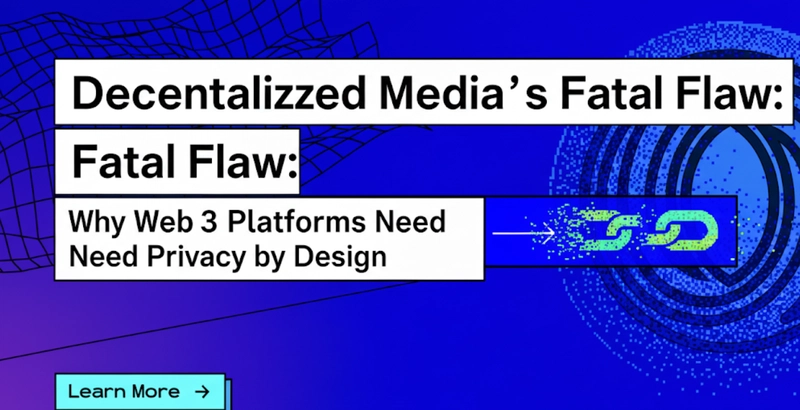If your decentralized social platform permanently records every like, comment, and connection on a public ledger, you haven’t disrupted Big Tech surveillance, you’ve made it immutable.
Web3 social media promised to fix everything wrong with centralized platforms: no more shadow banning, algorithmic manipulation, or corporate data harvesting. The vision was compelling, users own their data, creators get fair compensation, and censorship becomes impossible. But as these platforms launch in 2025, a fatal flaw is becoming clear: transparent blockchains create worse privacy problems than the platforms they’re trying to replace. When every social interaction becomes a permanent public record, we haven’t liberated social media, we’ve built the ultimate surveillance state.
How Transparent Blockchains Turn Social Media Into Permanent Surveillance
Traditional social media companies collect your data, but at least they keep it private (mostly). Transparent blockchain social platforms broadcast everything:
- Every like, share, and comment becomes a permanent public record
- Following patterns reveal your interests, relationships, and social circles
- Posting times and frequencies expose your daily routines and habits
- Engagement patterns show which topics, people, or content types you prefer
- Social graph connections map your personal and professional relationships forever
Think of it like having all your Facebook activity printed in the newspaper every day, with copies stored in every library forever. That’s not privacy-preserving, it’s a stalker’s dream database.
The Creator Economy Privacy Paradox
Web3 social platforms promise better creator monetization, but this creates new privacy dilemmas:
On Traditional Platforms:
- Creators share revenue data with the platform (private)
- Earnings and audience analytics stay between creator and platform
- Sponsorship deals and brand partnerships remain confidential
On Transparent Web3 Platforms:
- Every creator payment becomes public knowledge
- Revenue streams, earnings patterns, and audience value get exposed
- Competitors can analyze and copy successful monetization strategies
- Tax implications become public, creating personal security risks
Creators want fair pay, but they don’t want their financial lives broadcast to the world. Most will choose privacy over transparency every time.
When Engagement Metrics Become Stalking Data
Engagement tracking on transparent blockchains creates unprecedented surveillance opportunities:
- Behavioral pattern analysis – predicting someone’s actions based on their posting history
- Location inference – determining where someone lives based on posting times and engagement patterns
- Relationship mapping – identifying family members, romantic partners, and professional connections
- Interest profiling – building detailed psychological profiles from interaction data
- Influence network analysis – understanding who influences whom in social and professional contexts
This isn’t just about privacy, it’s about safety. When engagement data is public and permanent, it becomes a tool for harassment, manipulation, and exploitation.
Building Social Platforms Where Privacy Meets Transparency
The solution isn’t abandoning blockchain, it’s building smart privacy into social platforms:
1. Selective Social Transparency
Users should control what becomes public and what stays private. Essential platform functions (preventing spam, enabling discovery) can work without exposing all user behavior.
2. Confidential Reputation Systems
Trust and reputation can be built without exposing the underlying social data. Users can prove they’re good community members without revealing every interaction.
3. Private Creator Monetization
Revenue sharing, tipping, and sponsorship can happen confidentially while still providing transparency where it matters (like avoiding platform rent extraction).
4. Encrypted Social Interactions
Direct messages, group chats, and private communities should be private by default, with users choosing when to make interactions public.
Real Implementation: Privacy-First Web3 Social
Plurality Network’s Confidential Reputation Systems
Plurality Network demonstrates how social reputation can work privately:
- Aggregate social data from multiple platforms inside TEE-secured environments
- Generate reputation scores without exposing underlying social interactions
- Enable cross-platform identity while maintaining privacy across networks
- Support creator monetization based on private reputation metrics rather than public engagement farming
Sapphire’s Confidential Smart Contracts for Social
Sapphire’s confidential EVM enables private social features:
- Encrypted social interactions that participants control
- Private group management where membership and discussions stay confidential
- Confidential content monetization protecting creator revenue data
- Anonymous reputation voting that prevents gaming and manipulation
Account Abstraction with Privacy for Seamless Onboarding
Privacy-enabled account abstraction solves the Web3 social UX problem:
- Email-based signup without exposing blockchain addresses to social connections
- Private key management that doesn’t reveal wallet activity to social followers
- Gasless transactions that don’t create financial surveillance trails
- Cross-platform identity that works without linking all your accounts publicly
Privacy-Preserving Creator Monetization Models
Web3 social platforms can enable fair creator pay without financial surveillance:
- Confidential subscription systems where subscriber counts and revenue stay private
- Anonymous tipping and donations that protect both creator and supporter privacy
- Private sponsorship marketplaces where deal terms don’t become public competitive intelligence
- Encrypted revenue sharing that distributes platform profits fairly without exposing individual earnings
The Path Forward for Web3 Social Developers
If you’re building decentralized social platforms:
- Make privacy the default – users should opt into transparency, not opt out of surveillance
- Separate identity from activity – users need persistent identity without permanent activity logs
- Enable selective disclosure – let users choose what to share with different audiences
- Build confidential reputation – trust systems that work without exposing all social data
- Design for safety – prevent your platform from becoming a tool for harassment or exploitation
Ready to build privacy-first social platforms?
The future of social media isn’t about choosing between centralized surveillance and decentralized surveillance. It’s about building platforms that give users control over their privacy while maintaining the transparency and trust that make Web3 valuable.




